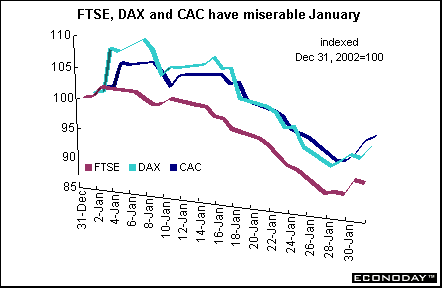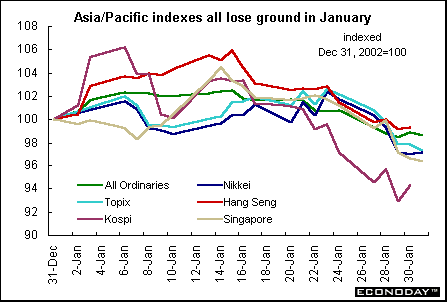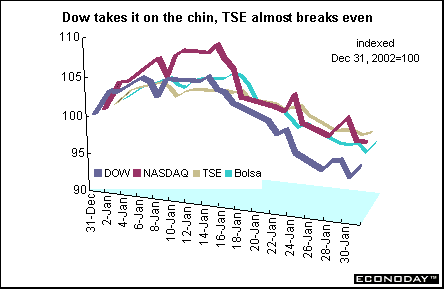
Europe and Britain
While the buildup to a possible invasion of Iraq has shaken confidence on Wall Street and sent stock prices back to October levels, the damage was far worse on European bourses. In London, share prices have plunged nearly 10 percent in a month, and now are trading at prices not seen in more than seven years. In Paris, they have fallen over 4 percent this year and in Frankfurt, 5 percent while the Dow has fallen 3.5 percent.
Stocks in London have been particularly hard hit, perhaps reflecting the fact that Britain's Prime Minister Tony Blair has been the staunchest ally of President George W. Bush in the standoff with Iraq. But investors may also be growing more concerned about possible vulnerabilities in the British economy, which has until now performed better than any other leading industrial country over the last three years. The economy has been kept going by a boom in consumer spending, fueled by sharp increases in home prices. But amid signs that housing gains are easing, some analysts worry that shoppers will no longer be able to keep up the pace.

The recent rise in the value of the euro against the dollar has provided little optimism. For many European multinationals, which now dominate the Continent's exchanges after the demise of many startup technology firms, the United States is the biggest export market and those sales are suddenly more expensive. These companies may not be able to meet optimistic profit expectations this year.
Investor morale is being worn down by a steady stream of news and government warnings that terrorist activity may spread to Europe. European investors seem more worried about the possible effects of a war than their U.S. counterparts. European business leaders have been particularly reluctant to plan new ventures and corporate financing activity remains in the doldrums, further undermining the market outlook.
Asia
Tokyo shares broke a five-day losing streak on Friday to close narrowly higher, but only after flirting with a 20-year low. Credit ratings agency Fitch Ratings downgraded the debt ratings of most major Japanese banks and said the long-term ratings outlooks remained negative. The downgrades reflect the weakening financial condition of the banks as well as the country's declining sovereign rating. Underlying the seemingly endless difficulties of the Japanese banks are structural economic problems. While Fitch has been hoping for decisive government action, to date there has been little more than discussion and study of these problems. Meanwhile, the 'pure' capital of the major banks is being rapidly consumed by asset quality and earning problems, although the degree of depletion varies significantly by bank.

The South Korean Kospi has been hardest hit by North Korean belligerence towards the rest of the world. Added to this has been investor unease about the Middle East situation. South Korea is a dominant exporter to the United States and its economy rises and falls on demand for its products. With most analysts predicting negative economic effects from possible war with Iraq, investors are ditching exporters on lower earnings prospects.
Americas
While shares here have not fallen quite as far as those in Britain or South Korea, market players in this continent are worried that a war with Iraq could undermine hopes of recovery. If Britain and the U.S. brush aside calls for caution by their European allies and go ahead with an invasion, this might open economic rifts between the world's big industrial countries and further depress stock markets. If a war proved long and led to a lengthy spell of high oil prices, this would be a blow to world economic growth and perhaps tip the U.S. back into recession.



Last Week's Highlights • Global Stock Market Indexes • Recap of Global Markets • Currencies • Indicator Scoreboard

The Bottom Line • Looking Ahead
|